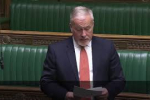On Wednesday, the Chancellor delivered his Autumn Statement to the House of Commons. Richard spoke in the debate which followed. His contribution to the debate can be watched at https://youtu.be/x_0WtM8mdao. His immediate reaction to the Statement can be watched at https://youtu.be/7ogEVaFmlO8.
Richard Fuller MP, who was in the Chamber for the Statement and then spoke in the debate afterwards (his contribution can be watched here) said:
I congratulate the Chancellor on delivering a tax-cutting budget, allowing businesses to fully expense their investments against tax; delivering a cut in NIC of 2% for employees and making sure the self-employed also pay less National Insurance. He also cracked down on the work shy, ensured the National Living Wage went up fully and that the triple lock for pensioners was fully recognised.
This is a good start in delivering Conservative values to get the economy growing and we have every expectation there is more to come. The Chancellor has pointed the ship of state in the right direction and I wish him full speed ahead as still have a very long way to go to get back to Conservative principles in public financing.
The measures included cutting the main rate of National Insurance Contributions from 12 per cent to 10 per cent. For the average worker earning £35,000 a year, that means a £450 tax cut. The Chancellor is also cutting and simplifying tax for the self-employed by abolishing an entire class of NICs and cutting the rate of the NICs top rate from 9 per cent to 8 per cent, with an average total saving of around £350 for someone earning £28,000 a year.
The Chancellor also boosted the National Living Wage to record levels of £11.44 an hour. This is a 9.8 per cent increase to the National Living Wage, benefiting 2.7 million workers. The government introduced the National Living Wage (NLW) in 2016 and is now increasing it yet again so that a full-time worker on the NLW will see their pay increase by over £1,800.
The Chancellor also announced measures to tackle long-term unemployment by strengthening support for those who want to work whilst toughening sanctions for those who are not looking hard enough for it. These reforms, which apply to existing and new claimants, mean no one will be able to sit on unemployment benefits for an extended period, without doing everything they can to find a job. To enforce this, the government will toughen sanctions for people not looking for work. This will highlight the expectation that those who can work must engage with the support available or face sanction. The Additional Jobcentre Support in England and Scotland will be extended – testing how intensive support can help claimants into work who remain unemployed or on low earnings after seven weeks into their Universal Credit claim. And mandatory work placements will be rolled out – those who have not moved into work by the end of their Restart course will be required to take such placements
The Chancellor is also boosting pensions, in line with the Triple Lock, by 8.5 per cent – the same as average wage growth, ensuring dignity in older age for those who have worked their entire lives. The Triple Lock will be maintained and will uprate the basic state pension, the new state pension and pension credit standard minimum guarantee by 8.5 per cent in April 2024. There will also be targeted support for those struggling with energy costs, through schemes such as the Warm Home Discount and the Winter Fuel and Cold Weather payments.
Local Housing Allowance rates will be increased to help the most vulnerable, meaning 1.6 million families will on average be £800 better off in 2024-25. All working age benefits will be increased in full by 6.7 per cent, boosting 5.5 million households who receive Universal Credit – an average of £470 a year. This is 3.0 percentage points higher than forecasted earnings for 2024-25 and will help support the most vulnerable whilst inflation continues to fall.
Alcohol duty is frozen until August, alleviating pressure on the hospitality sector. It would have been normal practice to uprate alcohol duty in line with inflation but to do so would have added 3 pence to the duty of a pint of beer or 18 pence to a bottle of wine, putting more pressure on the hospitality sector.
In light of inflationary pressures, especially with energy bills, the government is supporting small businesses with the cost of their business rates through a £4.3 billion package. Support includes freezing the business rates multiplier for small businesses for a fourth consecutive year, saving an average shop £1,650. A million British businesses will benefit from this, meaning an independent shop not benefitting from existing reliefs, with a rateable value of £50,000, will see savings of £1,650 next year. Support also includes extending the Retail, Hospital and Leisure (RHL) relief meaning 230,000 properties will benefit from almost £2.4 billion in support, protecting small businesses in our high streets and town centres.
Companies can now also permanently claim 100 per cent capital allowances on qualifying main rate plant and machinery investments. For every pound a business invests, its taxes are cut by up to 25p. This will generate £3 billion of additional business investment each year, and £14 billion over the next five years. The UK is now the only G7 nation to have full, permanent business expensing. This builds on the 2021 introduction of the super-deduction, which has led to the UK now having the fastest investment growth in the G7.

